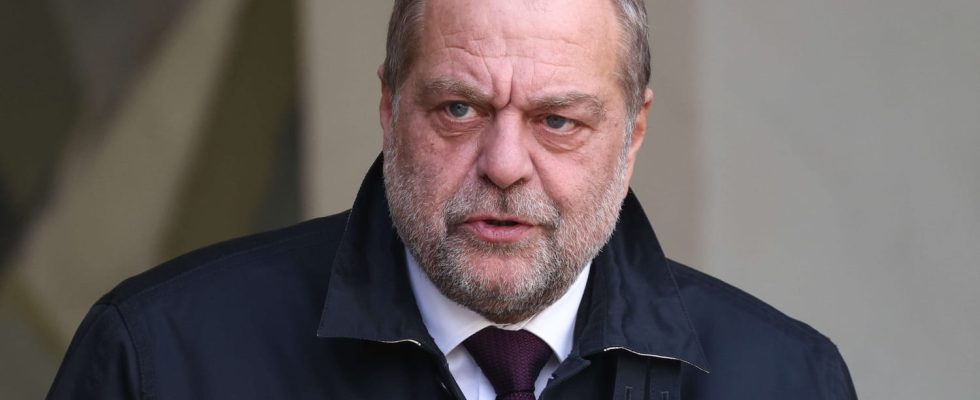Eric Dupond-Moretti appeared in court this Monday, November 6 and until November 17. Accused of “illegal taking of interests”, the Minister of Justice risks leaving the government in the event of conviction.
An unprecedented trial: that of a serving Minister of Justice, Eric Dupond-Moretti. The Minister of Justice appears from this Monday, November 6 until November 17 at the Court of Justice of the Republic (CJR) for “illegal taking of interests”. The man who brought many of his clients to justice finds himself this time on the other side of the bar and the trial involves many risks for the minister, starting with his future within the government.
The verdict could precipitate the departure of Eric Dupond-Moretti from Place Vendôme, but the head of the Chancellery begins this trial by retaining his title and his functions as minister. He can also count on the support of the Prime Minister who renewed her “confidence” in him a few hours before the hearing, at the microphone of France Inter. If at the beginning of October Elisabeth Borne had assured that a conviction would force the minister to leave the government, she did not mention this scenario this Monday, November 6 and preferred to highlight the “excellent work” of the former lawyer and recall his “right to the presumption of innocence”.
A conciliatory verdict for Eric Dupond-Moretti?
Only the CJR is authorized to judge a member of the government, it is therefore before this body that Eric Dupond-Moretti is expected. Created in 1993, the CJR ruled on 11 cases and its decisions were often considered too lenient: five suspended sentences, four acquittals and two convictions with exemptions from sentence were handed down. An indulgence which would come, according to its detractors, from composition of the jury formed by three professional magistrates, six deputies and six senators.
Politicians who judge other policies therefore. But doesn’t the game of alliance, solidarity between members of the same party and opposition between political forces risk influencing the decisions of the CJR? In the case of the trial of Eric Dupond-Moretti, those close to the minister complained about the personalities appointed to judge the former tenor of the bar. On the magistrates’ side, judge at the Court of Cassation Dominique Pauthe will preside over the trial and will be accompanied by two colleagues.
As for the political figures, six come from the majority (three deputies and three senators) and the other six come from the opposition. Among this second half is LFI MP Danièle Obono. An appointment which caused the minister’s entourage to jump, the elected official belonging to the same political family as Ugo Bernalicis who had filed a complaint against the minister. It is a lack of impartiality on the part of the LFI MP that is feared, but this criticism could also be made to the members of the majority brought to judge the minister.
An inevitable departure from the government?
Tried for “illegal taking of interests”, Eric Dupond-Moretti faces up to five years of imprisonment and a fine of 500,000 euros in accordance with thearticle 432-12 of the penal code. This text also specifies that all interests “likely to compromise [l’]impartiality, [l’]independence or [l’]objectivity” of the person incriminated fall under the sanction. These interests are not necessarily linked to the search for personal financial gains or profits as indicated by a judgment of the Court of Cassation of 2000.
Eric Dupond-Moretti also and above all risks leaving the government if he is found guilty of the facts with which he is accused. An additional sentence based on the ban on holding public office could indeed be imposed. Even without this sentence the “general rule” according to which a convicted minister cannot remain in office would apply, as the Prime Minister recalled in October. And if the sentence could be the subject of an appeal in cassation, it would be difficult for the former tenor of the bar as for the head of government to ignore this “general rule”.
If a conviction is possible, an acquittal of the minister is just as possible. The Minister of Justice would then be cleared of any suspicion of justice and could remain at Place Vendôme.
What is the Minister of Justice accused of?
Eric Dupond-Moretti is accused of having used his position as Minister of Justice to carry out retaliatory actions against magistrates in two different cases. According to the investigating commission of the CJR, consulted by Franceinfothe Minister of Justice “retained an interest likely to compromise his impartiality, independence or objectivity” “by initiating and then following the contentious administrative investigations” until Matignon took over responsibility for these files in October 2020 .
After his appointment to the Ministry of Justice, Eric Dupond-Moretti effectively opened administrative investigations against judge Edouard Levrault and then three magistrates from the National Financial Prosecutor’s Office (PNF). The first had estimated that his ouster from the principality of Monaco was due to his investigations into the Russian businessman, Dimitri Rybolovlev, and the director of the Monegasque judicial police at the time, Christophe Haget, the two men having been defended by Eric Dupond-Moretti. The three others were at the origin of the review of the telephone records of Eric Dupond-Moretti and other lawyers in the so-called “tapping” affair concerning Nicolas Sarkozy and in connection with Libyan financing. The lawyer then denounced an “abuse of authority” and an “attack on privacy”.
